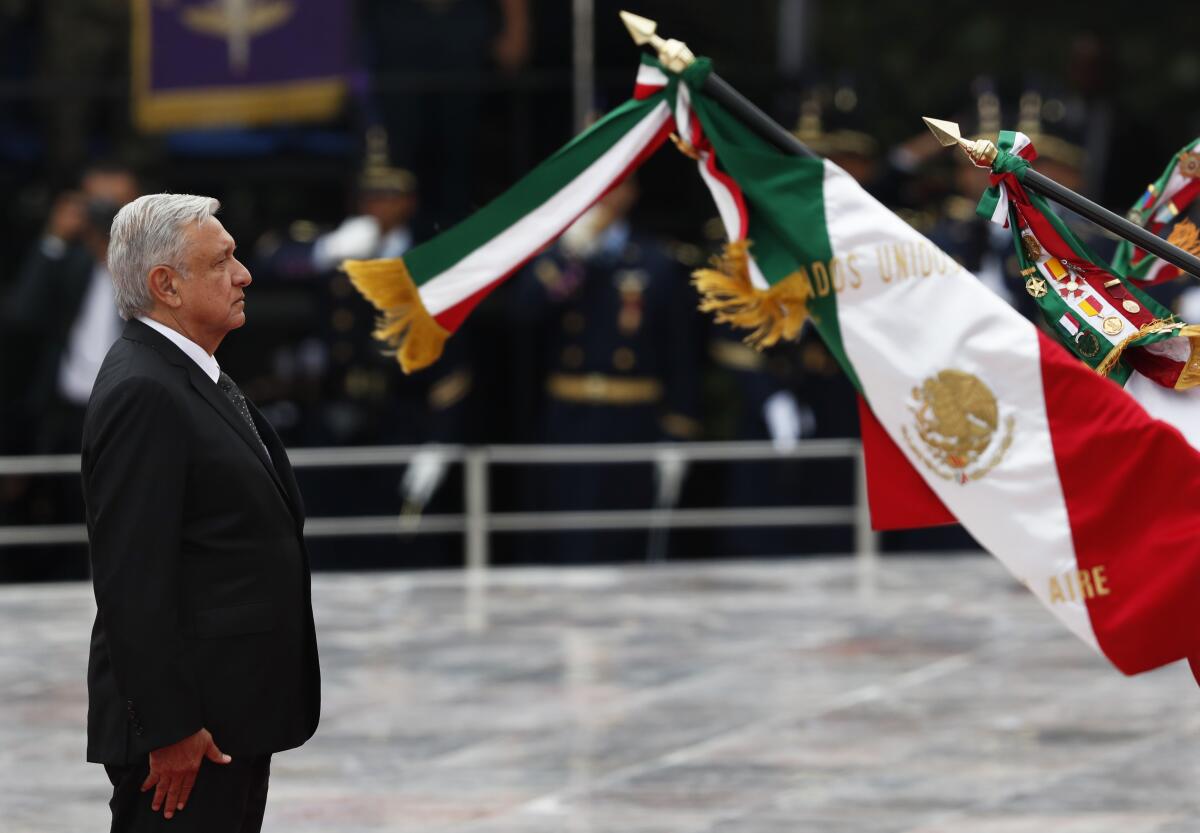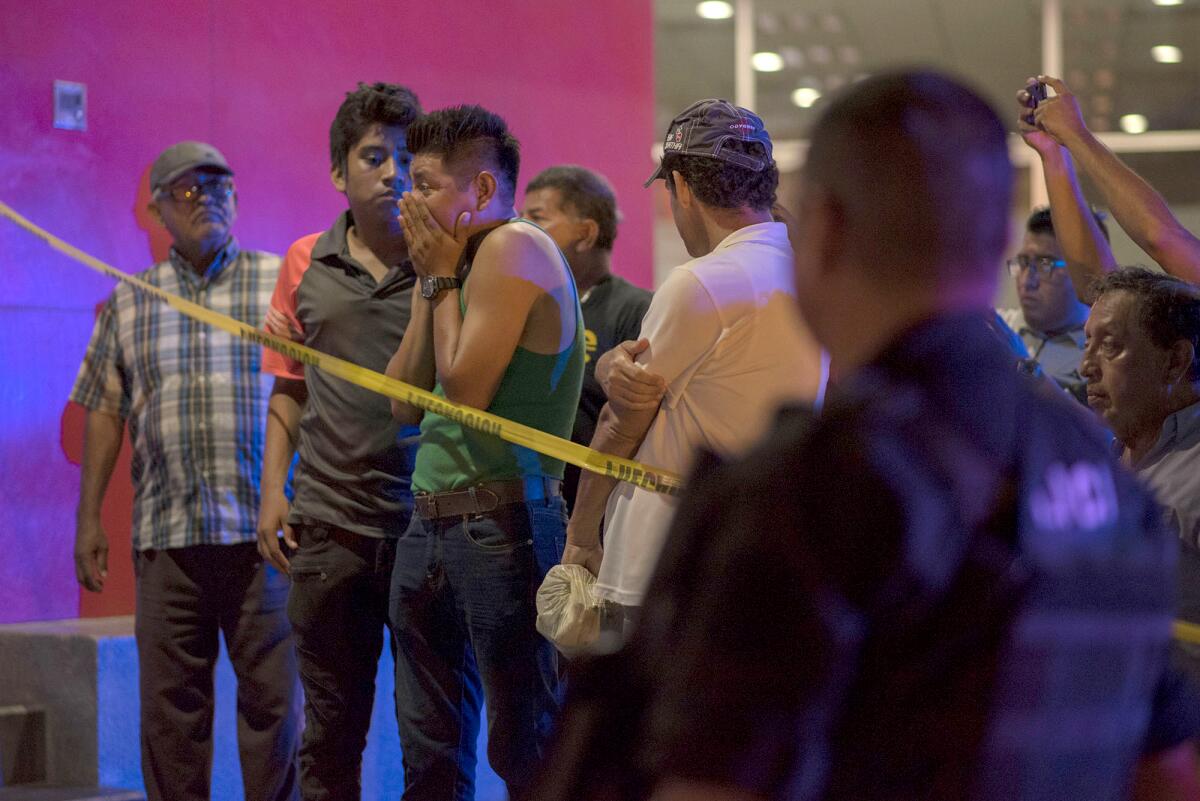Mexican President Lopez Obrador has transformed the office, but old problems thwart progress

- Share via
MEXICO CITY — On Sunday evening, as tens of thousands of flag-waving celebrants take to the streets to mark independence festivities, Mexican President Andres Manuel Lopez Obrador will perform a signature ceremonial duty — el grito (“the shout”), mimicking Miguel Hidalgo’s early 19th century call against Spanish rule.
It will be a first for Lopez Obrador, 65, a silver-haired history buff who took office Dec. 1 vowing a “fourth transformation” of Mexico — after the 1810 independence uprising, the political reforms enacted in the mid-1800s era of Benito Juarez, and the Mexican Revolution of 1910-17.
Less than a year into his six-year term, Lopez Obrador has indisputably transformed the optics of the Mexican presidency — which, under his predecessor, Enrique Peña Nieto, was a stodgy institution featuring a daily dose of heavily scripted public appearances that accentuated the gulf between Mexicans and their leader. Broad dissatisfaction with Peña Nieto set the stage for Lopez Obrador’s landslide victory in July 2018 and his self-proclaimed “regime change” agenda.
Lopez Obrador — Mexico’s first avowed leftist president in a generation — abruptly set a new tone: He eschewed use of the luxurious Mexican White House compound, Los Pinos, turning it into a park; he dispatched the bloated presidential guard detail back into the military and cut exorbitant government salaries; he moved to sell off the lavish presidential jet and began traveling commercial; and he instituted morning press briefings that, like President Trump’s Twitter outbursts, tend to set the daily news agenda.
The drastic change in approach, combined with Lopez Obrador’s common touch and frequent disparagement of elites — los fifis, or snobs — have helped garner approval ratings approaching 70%, and he is particularly popular among the poor and working-class multitudes.
“I don’t see any changes yet — prices remain high for rent, for food — but I believe that the president will manage to change this situation,” said Ricardo Diaz, 34, a sports trainer in the southern reaches of Mexico City. “He is an honest, simple man, without luxuries, a man who understands the people.”
Beyond the dramatic shift in style, however, there is little indication to date that the new president’s policies will amount to the “radical” change that Lopez Obrador promised. It is early in his term, but there are discordant signs.
Stubborn negative trends — rising crime, a sluggish economy, institutionalized corruption — have proved difficult to reverse.
In his initial state of the union address this month, Lopez Obrador declared, citing shaky evidence, that corruption was on the wane, the economy was on the upswing, and the crucial issue of crime — well, it isn’t where he wants it to be, but that’s not his fault.
“We still suffer from insecurity and violence,” Lopez Obrador conceded, citing the “bad strategy” of predecessors who declared a war against organized crime.
Homicides since January are on track to exceed last year’s record numbers, while kidnappings are up 9% compared with the same period last year, and extortion attempts have soared 37%.

Even as daily headlines report gang-related massacres in bars, on streets and elsewhere, Lopez Obrador’s anti-crime strategy appears opaque. His trademark security gambit was to create a National Guard force, now deployed across the country and numbering more than 50,000 and growing. But the guard is largely composed of Army and police personnel who were previously associated with the “militarized” anti-crime approach that Lopez Obrador says he abhors.
Crime “is not an easy problem to resolve,” Lopez Obrador told reporters last week, repeating his oft-stated contention that poverty drives rising lawlessness. (During the campaign, Lopez Obrador famously embraced “hugs, not gunshots.”)
“The young people were abandoned,” Lopez Obrador told reporters. “There are no equitable salaries. There is no sense of well-being and the government gave a bad example — a lot of corruption, impunity. But all of this is being attended to.”
How, exactly, remains a question mark.
Though Lopez Obrador himself is widely viewed as honest, some of his key backers are veteran political apparatchiks — so-called dinosaurs — who, critics say, have curiously amassed fortunes.
This month, a columnist for El Universal newspaper wrote of what he described as the multimillion-dollar “real estate empire” of Manuel Bartlett, an ex-senator and former chief of domestic security whom Lopez Obrador appointed to head the state-owned electrical utility. Some two dozen of Bartlett’s properties, many in wealthy districts, do not appear in his required public declaration of wealth, the columnist wrote.
Bartlett, appearing with Lopez Obrador at the president’s regular morning news briefing, denounced the allegations as false and said he welcomed an inquiry.
Lopez Obrador defended Bartlett and pinned the story on some of his favorite targets — scheming “conservatives” and “neo-liberals.” The latter is the president’s catch-all pejorative for Mexican leaders who, in his view, have ransacked the country’s wealth and championed profits above the social well-being of Mexicans.
One of Lopez Obrador’s cornerstone campaign pledges was to create brisk economic expansion in a country that in recent years has endured listless annual growth rates of about 2%. But the president has rejected economists’ alarming projections of a mere 1% growth in Mexican economic activity in 2019, his first full year in office. Instead, he cites vague “other facts” and touts the salutary effect of enhanced social spending for the elderly, disabled, students and others.
“The president says that, although there is no economic growth, there is more development and more well-being,” Valeria Moy, an economist, wrote on Twitter following Lopez Obrador’s sunny take in his state of the union address. “There is not a single fact that verifies this assertion.”
Such criticism, however, gains limited public traction. Lopez Obrador’s Morena political bloc, which he created in 2014, also controls both houses of the Mexican congress, along with many state governments and Mexico City. The concentration of power mirrors that of the once-hegemonic Institutional Revolutionary Party, which ruled Mexico for much of the 20th century — and counted Lopez Obrador among its loyalists until he and other leftists split in the 1980s.
For years, Lopez Obrador stood as the leading public face of the Mexican opposition, positioning himself as a kind of hovering moral authority while losing two presidential runs before finally breaking through in 2018. No opposition figure today has the standing and media presence to critique Lopez Obrador to a wide audience.
“The opposition is in a shambles, and no one is really challenging Lopez Obrador for control of the narrative,” said Carlos Bravo Regidor, a columnist for Reforma newspaper. “Lopez Obrador doesn’t have a Lopez Obrador to engage in battle with him.”
While projecting the image of someone’s likable uncle, observers say, Lopez Obrador is a figure of profound ambition who can be stubborn, even obdurate, possessing an almost messianic belief in the righteousness of his views. The president has said that he would like to pass into history like Benito Juarez, the revered embodiment of Mexican nationalism. But, almost a year into his term, a “fourth transformation” remains more aspirational than real.
Cecilia Sanchez of The Times’ Mexico City bureau contributed to this report.
More to Read
Sign up for Essential California
The most important California stories and recommendations in your inbox every morning.
You may occasionally receive promotional content from the Los Angeles Times.












